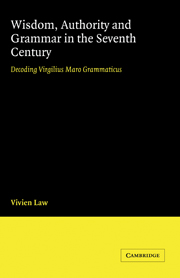Book contents
- Frontmatter
- Contents
- Preface
- Abbreviations
- Introduction
- 1 The outer layers: parody and word-play
- 2 The wisdom tradition
- 3 Avarice and the four keys to wisdom
- 4 The multifarious nature of wisdom
- 5 Heretical knowledge? The constitution of man
- 6 The Epistolae: Virgilius' Retractatio?
- 7 Concealment of mysteries: the techniques of secrecy
- 8 Virgilius and the seventh century
- 9 Conclusion
- Appendix 1 Epistola II 14-93: The vocative of ego
- Appendix 2 Epitome XV: The catalogue of grammarians
- Notes
- Works cited
- Index
Appendix 2 - Epitome XV: The catalogue of grammarians
Published online by Cambridge University Press: 10 November 2009
- Frontmatter
- Contents
- Preface
- Abbreviations
- Introduction
- 1 The outer layers: parody and word-play
- 2 The wisdom tradition
- 3 Avarice and the four keys to wisdom
- 4 The multifarious nature of wisdom
- 5 Heretical knowledge? The constitution of man
- 6 The Epistolae: Virgilius' Retractatio?
- 7 Concealment of mysteries: the techniques of secrecy
- 8 Virgilius and the seventh century
- 9 Conclusion
- Appendix 1 Epistola II 14-93: The vocative of ego
- Appendix 2 Epitome XV: The catalogue of grammarians
- Notes
- Works cited
- Index
Summary
1 The first was an aged man by the name of Donatus, at Troy, who lived, they say, for a thousand years. When he came to Romulus, the founder of the city of Rome, he was received with the greatest rejoicing and stayed there for four years. During this time he built up a school and left innumerable works in which he posed various riddles, saying: ‘My son, who is the woman who offers her breasts to countless offspring, and however much they are sucked they flow just as richly?’ The answer is Wisdom. ‘What is the difference between word (verbum), speech (sermo), sentence (sententia), utterance (loqueld) and discourse (oratio)?’ Whatever the tongue and voice produce is word; speech, however, which gets its name from the combination of two words, SERendo ‘sowing’ and MOnendo ‘admonishing’, is more ornate and diligent; a sentence is what is conceived with one's sense; an utterance is when the sequence of speech (dictio) is woven with a certain degree of elegance; and discourse is when oratorical speech reaches the point of elaboration with the hands.
2 Likewise at Troy was Virgilius, a pupil of that Donatus. He was extremely energetic at copying out verses. It was he who wrote seventy books on metre and a letter on the verb sent to Virgilius of Asia. The third Virgilius is myself.
3 Virgilius of Asia was the student of the aforesaid. He was a man so solicitous to the needs of holy persons that a call never found him sitting idly.
- Type
- Chapter
- Information
- Wisdom, Authority and Grammar in the Seventh CenturyDecoding Virgilius Maro Grammaticus, pp. 112 - 115Publisher: Cambridge University PressPrint publication year: 1995

